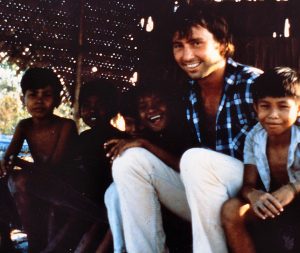American Andy Pendleton has spent his entire adult life providing relief for civilians in war-torn countries from Southeast Asia to Africa and in his own words he has witnessed the “full spectrum of war and fighting, death and misery, pain and politics.”
Most of his work was with the United Nations and its Office for Coordination of Humanitarian Affairs (OCHA) and included Cox’s Bazar in Bangladesh where about a million people are still housed in refugee camps after fleeing the violence in Myanmar.
After graduating from East Tennessee State University in the late 1970s, Pendleton moved to the Thai-Cambodian border as a coordinator in the refugee camps where hundreds of thousands had sought refuge, initially from the Khmer Rouge and then the invading Vietnamese.
By 1983, he had risen through the ranks and earned a reputation for his innovations in providing safety and protocols for U.N. relief workers. Pendleton went on to work in Afghanistan, Iraq, Sudan, Cameroon, Thailand and Pakistan, among other countries.
He left OCHA in 2016 and has since worked as a consultant and an emergency response co-ordinator with a wide range of non-governmental organizations.
Pendleton was recently in Phnom Penh where he spoke with The Diplomat’s Luke Hunt about the successes and failures of rescue work, and problems that have escalated in recent years to a point where the world has reached a “dangerous juncture.”
It’s a situation not helped by global attention and media fixation on Israel’s war in Gaza and the Russian invasion of Ukraine, which he says has made it difficult to raise funding and provide relief in other countries that are sorely in need, particularly in Africa, which he describes as a “silent cry for help.”
































